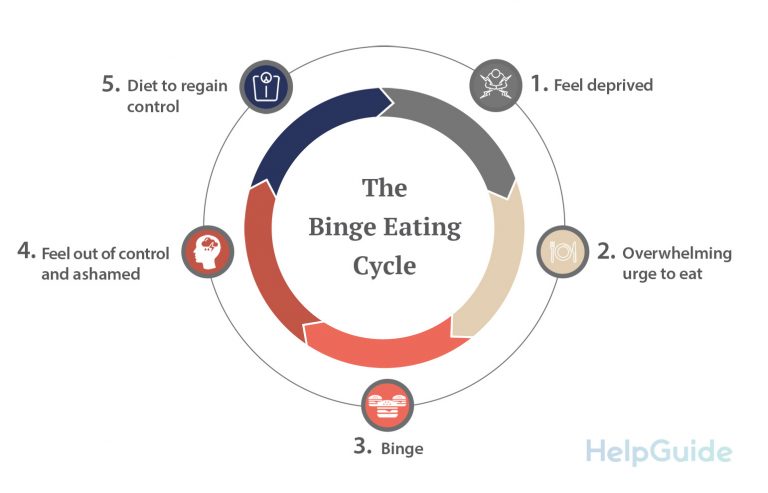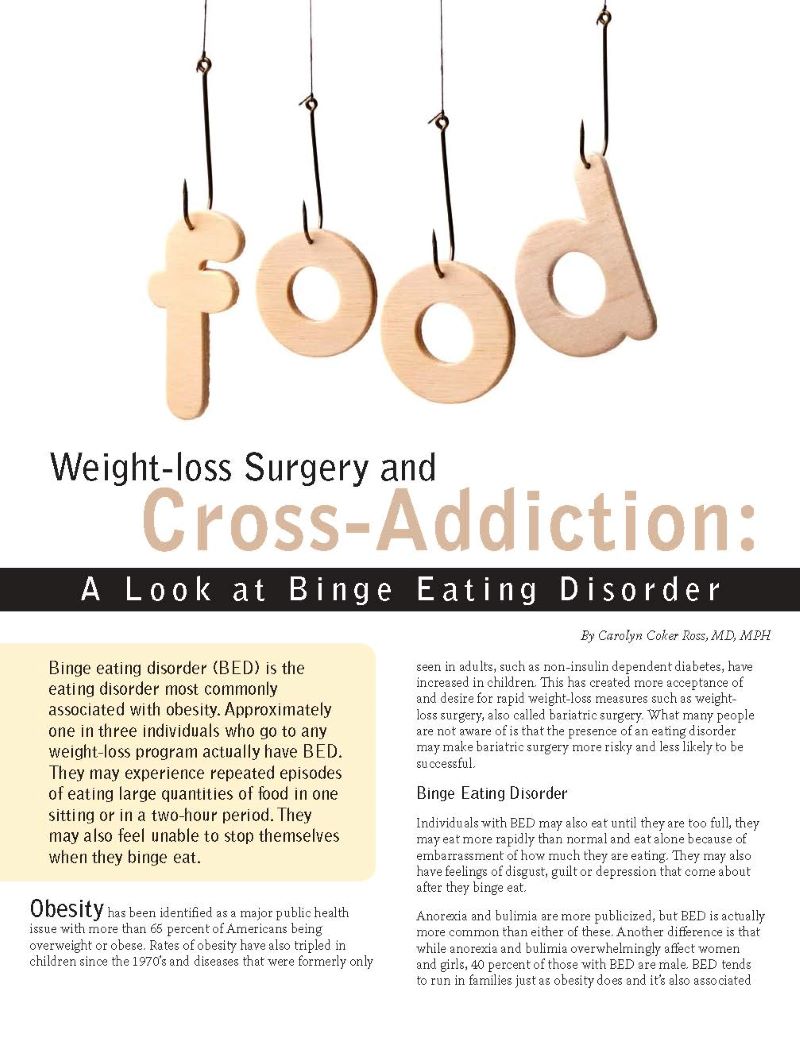To lose weight with a binge eating disorder, focus on seeking professional help and addressing the underlying psychological issues contributing to the disorder. Beneath the surface reasons for binge eating often lie emotional triggers, stress, or unresolved trauma.
By working with a therapist or counselor experienced in eating disorder treatment, you can develop coping strategies, learn to recognize triggers, and cultivate healthier habits. Additionally, practicing mindful eating, engaging in regular physical activity, and establishing a support network can all contribute to weight loss and overall wellbeing.
Remember, healing from a binge eating disorder is a journey that requires patience, self-compassion, and professional guidance.

Credit: www.helpguide.org
Understanding Binge Eating
When it comes to understanding binge eating, it is essential to define this disorder, identify its causes and triggers, and explore how it can affect weight loss efforts. Binge eating is characterized by consuming large amounts of food in a short period, feeling a loss of control during these episodes, and experiencing emotional distress afterwards. This eating disorder can be challenging to overcome, but with a combination of professional help, self-awareness, and healthy lifestyle changes, it is possible to manage binge eating and achieve weight loss goals.
Definition Of Binge Eating
Binge eating is a type of eating disorder where individuals consume excessive amounts of food, typically in a short span of time, and feel a lack of control during these episodes. Unlike other eating disorders like anorexia or bulimia, binge eating is not followed by compensatory behaviors like purging or excessive exercise.
Causes And Triggers Of Binge Eating
The causes of binge eating can vary from person to person, but several factors contribute to the development and persistence of this disorder. Some common causes and triggers include:
- Emotional and psychological factors: Binge eating often serves as a coping mechanism for dealing with emotions such as stress, anxiety, depression, or loneliness.
- Poor body image and low self-esteem: Negative thoughts and feelings about one's body can contribute to binge eating episodes, as individuals may turn to food for comfort or to numb emotional pain.
- Dieting and restrictive eating: Strict diets and deprivation can create feelings of deprivation, leading to episodes of binge eating as a response to the body's need for nourishment.
- Environmental factors: Certain environments, such as social gatherings or the presence of easily accessible high-calorie foods, can trigger episodes of binge eating.
- Hormonal imbalances: Fluctuations in hormones, particularly those related to appetite regulation, can contribute to the development and persistence of binge eating disorder.
It is essential to recognize that each individual's experience with binge eating disorder may be unique, and understanding the underlying causes and triggers specific to one's situation is crucial for effective treatment and management.

Credit: www.cambridge.org
Effects Of Binge Eating
Binge eating can have detrimental effects on weight, but it is possible to lose weight with a binge eating disorder. By seeking professional help, developing healthy eating habits, and finding alternative coping mechanisms, individuals can manage their disorder and achieve their weight loss goals.
Weight Gain And Its Consequences
Binge eating can lead to significant weight gain. During a binge episode, people with binge eating disorder consume large amounts of food in a short period, often feeling a loss of control over their eating. This overeating can result in a calorie surplus, leading to an increase in body weight over time. When excessive amounts of calories are consumed regularly, the body stores the excess energy as fat. This can cause a gradual and steady weight gain, which can lead to obesity if not addressed. Obesity, in turn, is associated with a wide range of health problems, including:- High blood pressure: Excess weight puts added strain on the heart, causing elevated blood pressure.
- Cardiovascular disease: Obesity increases the risk of developing heart diseases and strokes.
- Type 2 diabetes: Being overweight is a significant risk factor for developing diabetes.
- Joint problems: Carrying excess weight puts stress on the joints, which can lead to conditions such as osteoarthritis.
- Sleep apnea: Obesity is a common cause of sleep apnea, a condition where breathing repeatedly stops and starts during sleep.
- Low self-esteem: The physical consequences of weight gain can negatively impact self-image and self-worth.
Emotional And Psychological Impact
Beyond the physical consequences, binge eating can also have a profound emotional and psychological impact. People with binge eating disorder often experience a variety of negative emotions associated with their eating behaviors. These may include guilt, shame, embarrassment, and a loss of control. The cycle of binge eating and emotional distress can create a vicious cycle, where food becomes a source of comfort in moments of distress. However, this temporary relief is often followed by feelings of guilt and further emotional turmoil, perpetuating the cycle. Additionally, binge eating disorder is often accompanied by various psychological issues, such as:- Depression: Binge eating disorder is often linked to depressive symptoms, with individuals turning to food as a coping mechanism.
- Anxiety: The stress of dealing with binge eating episodes and the resulting consequences can contribute to feelings of anxiety and heightened stress levels.
- Body image issues: Binge eating disorder can exacerbate negative body image perceptions, as weight gain and feelings of loss of control may reinforce negative self-perceptions.
- Social isolation: Many individuals with binge eating disorder may withdraw from social activities due to shame and embarrassment related to their eating behaviors.
Strategies To Overcome Binge Eating And Achieve Weight Loss
If you're struggling with a binge eating disorder, you may feel overwhelmed and unsure of how to approach weight loss. However, with the right strategies and support in place, it is possible to manage your binge eating and achieve your weight loss goals. In this article, we will discuss effective strategies for overcoming binge eating and developing healthy habits that can lead to sustainable weight loss.
Building A Support System
Building a strong support system is essential when it comes to overcoming binge eating and achieving weight loss. Surrounding yourself with a network of understanding and encouraging individuals can provide the guidance and support you need on your journey towards recovery. Here are a few steps you can take to develop a support system:
- Share your struggles and goals with trusted friends and family members who can provide emotional support.
- Consider joining a support group or online community of individuals who are going through similar experiences.
- Consult with a therapist or counselor who specializes in treating binge eating disorders.
Developing Healthy Eating Habits
Developing healthy eating habits is crucial for both overcoming binge eating and achieving weight loss. By making gradual changes to your eating patterns and adopting a balanced approach to nutrition, you can establish a healthier relationship with food. Here are some strategies to help you develop healthy eating habits:
- Create a meal plan that includes a variety of nutrient-dense foods to ensure you're getting all the essential nutrients your body needs.
- Eat regular, balanced meals and avoid skipping meals, as doing so can increase the likelihood of binge eating episodes.
- Practice mindful eating by paying attention to the taste, texture, and satisfaction of each bite, rather than eating on autopilot.
- Avoid labeling foods as "good" or "bad" and instead focus on moderation and portion control.
Managing Emotional Eating
Emotional eating often goes hand in hand with binge eating disorders, as individuals may turn to food as a way to cope with difficult emotions. Learning how to manage emotional eating can significantly contribute to overcoming binge eating and facilitating weight loss. Here are some strategies to help you manage emotional eating:
- Identify your triggers for emotional eating and find alternative coping mechanisms, such as engaging in physical activity, practicing deep breathing exercises, or seeking support from loved ones.
- Keep a food and mood diary to track your emotions and food choices, allowing you to recognize patterns and make more informed decisions.
- Learn stress management techniques, such as meditation or journaling, to help you navigate challenging situations without resorting to unhealthy eating patterns.
Seeking Professional Help
If you're struggling to overcome binge eating or achieve weight loss on your own, it may be beneficial to seek professional help. Qualified healthcare professionals, such as therapists, registered dietitians, and doctors, can provide the necessary guidance and treatment to support your recovery. Here are a few reasons why seeking professional help can be beneficial:
- A qualified therapist can help you address the underlying emotional and psychological factors contributing to your binge eating disorder.
- A registered dietitian can design a personalized meal plan that supports both your nutritional needs and weight loss goals.
- A doctor can assess your overall health and provide guidance on any necessary medical interventions.

Credit: www.obesityaction.org
Frequently Asked Questions For How To Lose Weight With A Binge Eating Disorder?
Can You Lose Weight While Having A Binge Eating Disorder?
Yes, it is possible to lose weight while having a binge eating disorder. However, it is crucial to seek professional help and develop a comprehensive treatment plan that addresses both weight loss and the underlying issues causing the disorder. This may involve therapy, support groups, and developing healthy eating habits.
What Are Some Strategies To Manage Binge Eating And Lose Weight Simultaneously?
To manage binge eating and lose weight, try adopting mindful eating practices, such as listening to hunger and fullness cues, keeping a food diary, and focusing on nutritious, balanced meals. Avoid restrictive diets, as they can trigger binge eating episodes.
Consulting a healthcare professional or Registered Dietitian can provide personalized strategies for success.
Can Exercise Help In Losing Weight If You Have A Binge Eating Disorder?
Yes, exercise can be beneficial for weight loss and managing a binge eating disorder. Engaging in regular physical activity not only aids in burning calories but also helps improve mood, reduces stress, and promotes a healthier body image. However, it is important to exercise in moderation and avoid using it as a punishment for overeating.
Conclusion
If you struggle with a binge eating disorder, losing weight may feel like an overwhelming challenge. However, it is possible to manage your disorder and achieve your weight loss goals with the right strategies and support. By focusing on mindful eating, seeking professional help, and practicing self-care, you can develop a healthier relationship with food and improve your overall well-being.
Remember, it's important to be patient and kind to yourself throughout this journey. With determination and the right tools, you can overcome your binge eating disorder and achieve lasting weight loss.
Comments
Post a Comment